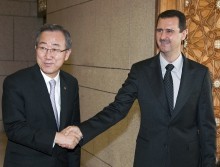
Can Russia the Syrian Assad regime? Syrian President Bashar al-Assad (right) shakes hands with UN Secretary-General Ban Ki-moon (left). Illustrative. Photo Courtesy of UN Photo/Eskinder Debebe.
With a variety of nations already involved in Syria’s complex civil war—ranging from the US to Turkey to Iran—why is Russia’s late arrival to the conflict such a big deal? It’s not like this is a new development for Russia: They have been allies with the Bashar al-Assad regime in Syria for many years and have already flexed their military muscles with invasions and interference in Georgia and Ukraine.
So why are the Americans so concerned by the Russian involvement in Syria? Because this marks a potential turning point in the war that favors the cruel dictator Assad, and it may also mark a turning point in Russia’s return to power in the Middle East. Here’s a closer look:
- Assad Needs Russia to Win
The BBC reported that the Assad regime has been sputtering in their fight against the forces battling their regime, and the US is concerned that Russia could impact that balance and push off a peaceful resolution. In comments posted to the Pentagon website last week, Press Secretary Peter Cook said they think that “further military support” for Assad is “counterproductive” to achieving a political resolution.
It’s easy enough to see why. The US has long said Assad must leave, having brutally waged war against his own people for four years. So if Assad is on the cusp of losing, the regime might buckle and be more open to dramatic compromise.
However, a resurgent Assad with the might of Russia to carry him on could keep fighting for many more years.
- Russia’s Return Will Help the ‘Axis of Evil’ to Rise
Not only will Russia bolster Assad, but an established military presence in Syria could prove to be a boon for Iran and their allies as well. A top member of the Iranian Revolutionary Guard Corps recently visited Russia twice, reported Ynet, citing the Lebanese As-Safir newspaper.
With a Russian air base in Syria, such coordination could be even easier. Russia has long been a supporter of Iran, and with Iran’s reemergence in the world following the lifting of sanctions as part of the nuclear deal, Iran could have a powerful friend close at hand.
- Russia Will Complicate the War on Terror
Ynet already reported the possibility that Russia’s military presence in Syria could make things more complex for Israel’s ability to target weapons in Syria bound for Hezbollah terrorists. Israel has long sought to prevent Hezbollah from acquiring advanced weapons and is believed to have bombed such targets in Syria when necessary.
So far, they haven’t been caught. Russian planes or anti-aircraft vehicles in Syria could make that harder to accomplish.
Meanwhile, the US-led coalition that’s bombing ISIS in Syria could also have to take Russian planes into consideration—at least logistically. Cook told reporters last week that “deconflicting” with Russian planes hadn’t come up yet, but that was because the Russians weren’t flying in Syria at that time. The BBC reported that a separate US spokesman said Russia’s presence could cause problems.
Cook was careful not to label the Russians as a threat to coalition planes, but he didn’t explicitly exclude them either. “We’re tracking [the Russian] developments closely. I’m not going to get into intelligence assessments from up here,” said Cook. “You can be sure that our coalition aircraft, US aircraft flying into Syria will take into account everything that we see as a potential threat. And I’m not talking about what we see specifically with the Russian presence in Syria. I’m just talking in general.”
- Russia’s World Power Status Is Reviving
Much like during the Cold War, Russia’s resurgence in the Middle East makes it an alternative friend to the nations in the Middle East. If the US won’t sell you the weapons you want, Russia is available. If you’re tired of supporting an ally of the US, there’s room with the super power backing the other side.
For the first time in more than two decades, Russia could pose a viable counterbalance of power to the US in the Middle East. That could result in heightened conflict and tensions.
If Russia is backing a nation battling Israel, for example, that could limit the American response lest the Russians also escalate their involvement. A two-nation joust could quickly turn into a war with global implications.
More seriously, Iran is already a major power in the region with limited Russian assistance and with Syria and Hezbollah bogged down in the Syrian civil war. If Russia rescues the Assad regime, that will free up Hezbollah to focus on Israel. And with Russia on their side to rival the US, Iran will be one of the two most powerful nations and militaries in the Middle East.
In short, there are multiple reasons for the US to be concerned about Russian intervention in Syria. And the Americans likely aren’t the only ones concerned about it.
(By Joshua Spurlock, www.themideastupdate.com, September 21, 2015)
